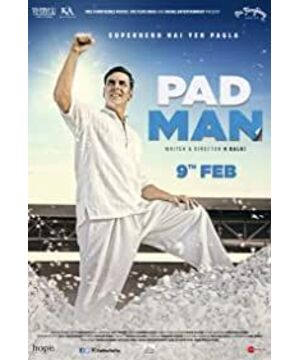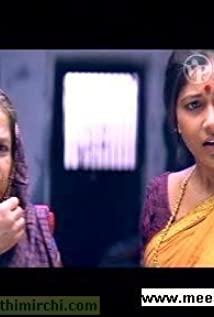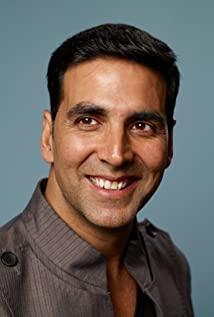After watching "The Padman", I feel relatively relaxed, and I have a very clear impression of the story. This is the common advantage of most high-quality Indian films. The traditional style of singing and dancing is used to tell the story clearly. Also have some thoughts of my own. 1. Regarding the translation name, I prefer the literal translation of "The Padman" rather than the translated name of "The Indian Partner", which was released in the mainland. The reason is not difficult to understand. The cultural environment of the mainland is not much more advanced than that of India. Sanitary pads are still out of the way, and sex-related information is still shy. 2. The menstrual poverty story is in the background of the times that India's menstrual poverty is extremely serious, which is not only related to the low economic level, but also to the feudal ignorance deeply rooted in Indian soil. India is a religious country, and its traditional culture regards women's menstruation as filthy, and it is even staggering to stay indoors during menstruation. However, after consulting the information, I found that traditional China is not much better. In some rural areas of China, women who have menstruation mean that they are 'unclean'. Even at the funeral of a loved one, they cannot kneel, watch the night, and burn paper money. Touching all the items prepared for the deceased, and not even seeing the body of the deceased, otherwise it would be disrespectful to the deceased. As an ordinary man, my understanding of menstruation only stems from my concern for my girlfriend. If I didn't have a girlfriend, I might never know that half of the human population would suffer this kind of torture in their lives. In addition, I can't understand the meaning of menstruation for human existence. As a human being, a man, a man, I sincerely hope that menstruation can disappear from this world. But facing the reality, I can only call on the society to understand and care for women more, pay attention to menstrual poverty, at least not let sanitary napkins become women's troubles. 3. The attitude of Indian women towards menstruation is due to the too feudal tradition. Indian women themselves regard menstruation as an unspeakable filth. Economic conditions make the vast majority of women prefer to choose dirty cloth strips rather than buy clean sanitary napkins, which has led to a large-scale incidence of female diseases in India. The words of the male protagonist's wife are very memorable to me, "I am more afraid of shame than disease." What is shame is more terrible than disease, it is obviously the ignorance and stubbornness rooted in the whole Indian society and the hearts of everyone! Even Indian women themselves chose to succumb, which is really helpless. 4. The status of women in India The status of women in India is relatively low, and women are only subordinates of men, which is also reflected in the film: the ones who can produce "dirty" menstruation are naturally "dirty" women, and scold the wife who fell on the toilet The poor wife who broke the water pipe and had to endure the alcoholic husband without a job... But the male lead has become a kind of male, he loves his wife very much, and treats women equally, his outstanding character can be seen . Whether it is India or other countries, including China, women will face more or less prejudice and injustice in society. This is limited by physiological conditions, and it is the result of the evolution of human civilization over thousands of years. I hope and believe that The development of civilization will bring fairer treatment to women. A civilization in which men and women respect each other, understand each other and communicate with each other is the civilization that human beings pursue. 5. About the heroine The movie is roughly set with two heroines. The first half is the male lead's original wife, and the second half is the "confidant" Parry who helps the male lead to the peak of life. In the process of watching the movie, you can clearly feel the contrast between the original wife and Parry. I guess the movie is to use the two heroines to represent the two categories of women in India. One is the well-educated ladies. The contrast between the two is obvious. One can't understand the husband's "excessive" love, which creates a estrangement with him, while the other appreciates the male protagonist and helps him along the way and even develops love. But there is no good or bad between the two. I think they are both good people in their respective growth environments and classes, and they all have shining points worthy of admiration. As a digression, I found that the first half of the film used a huge amount of space to introduce the male protagonist's idea of making sanitary napkins and the many obstacles he encountered. In the second half, the male protagonist became smooth after meeting Parry, and I felt a little rhythm change. It's a bit fast (maybe the director wants to focus on criticizing the social reality of India hahaha). 6. Regarding the ending, I saw that some people were very dissatisfied with the ending and hoped that the male protagonist and Parry would be together. I myself agree with the ending, regardless of the true ending of the prototype story (there seems to be no character Parry in the prototype story), if the male protagonist chooses Parry in the end, then the character of the male protagonist will lose his humanity. Brilliant, the character can't stand. I had almost the same thoughts as Parry in the end. Parry said, "If he stays, then he is not the one he loves." The same is true for me. I prefer to see the male protagonist choose the wife he loved at first. This also shows that after experiencing the temptation, he has not forgotten the reason why he embarked on this road. 7. The connection with Chinese movies "The Padman" first reminded me of "I am not the God of Medicine", both of which have realistic prototypes and are related to social events. But the comparison of the two reminds me of the films "Lost Orphan" and "Dear". The impression they and "I Am Not the God of Medicine" gave me are tear-jerking blockbusters, just to make you cry, and in some places to be sensational, let I feel like the original stories of these Chinese movies, which are changed with real events, have to be tragic events like this? (Maybe it’s because I read too few films.) In addition, my point of view is that in China, there are still too few films that reflect reality. China especially needs this type of films. Film is art, and art comes from life. To affect life, we need to use the power of film to improve the society we live in.
View more about Pad Man reviews











